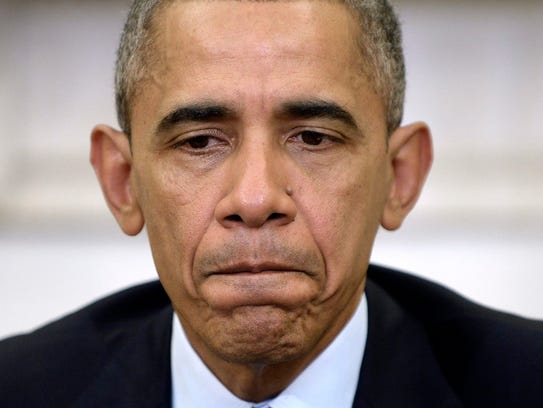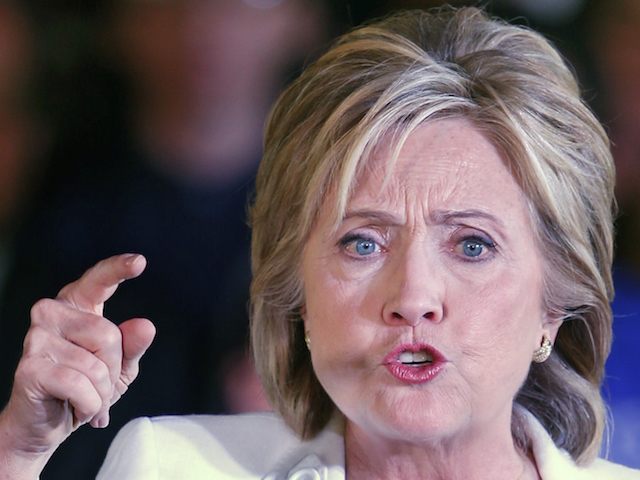The ongoing competition to express the worst possible views--known to many observers simply as the US Presidential Election--escalated this week in the wake of the Orlando tragedy. Donald Trump predictably took an early lead in this episode by saying the following:
And of course, what Republican response to terrorism would be complete without an inane shout-out to the "call it radical Islam" brigade?
Clearly, Donald Trump set a very high bar here. As
Justin Raimondo predicted (and we mentioned) earlier this week, Trump doubled down on his calls for a ban on Muslim immigration (which obviously follows, since the shooter was born in New York). He also called for
increased bombings of ISIS so we can "win", whatever that means these days. This is another logical policy, since
no one thinks that ISIS directed this attack, and the shooter himself had previously expressed support or allegiance for radically different militant groups ranging from
Hezbollah to ISIS, which are actually completely opposed to each other.
The question was how Hillary would respond. And in some ways, she had the perfect Democratic script totally laid out for her by President Obama. Her job was to push back against Trump's apocalyptic claims about Muslims in general, maybe say something vague about American values, and then pivot to that bread and butter Democratic issue of gun control. This sidesteps the tricky reality that Obama's current policy of bombing ISIS and arming some not-so-different rebel groups on the side has failed to stop attacks. It would also allow Democrats to portray themselves as the adults compared to Donald Trump's efforts to channel Dick Cheney on terrorism. And since there's no way Congress will actually pass meaningful gun control legislation, it also gives Democrats a kind of out if and when the next terrorist attack / mass shooting occurs--something like, "We told you we needed an assault weapons ban, but the Republicans cared more about hunting than innocent American lives, and now X more deaths are on their hands."
This is an ideal strategy politically, and it also offers a facially plausible rejoinder to Trump's claim that current leadership is weak and powerless to stop these attacks. Implicitly, it accepts this as true, but then passes the blame to Trump's party.
In short, the path for Hillary was obvious and it's already been largely carved out by President Obama. Given that, unlike Hillary, President Obama is actually
still viewed somewhat favorably by Americans, this strategy should have been even easier to pursue. Politically, Hillary needs to position herself as running for President Obama's third term; it's really her only angle. So breaking with Obama on any issue, even when it could be warranted, has negative political implications.
So, with all these good reasons to follow in Obama's footsteps, did Hillary decide to take the logical path of least resistance? Of course not.
It started out well enough. Hillary led with the gun control narrative.
And paid lip service to diversity and defending the LGBT community from violence...
(In that last tweet, I assume the character limit caused her to omit the fact that "always" began around 2013, when Hillary discovered that supporting measures like marriage equality had become politically expedient. But I digress.)
To her credit, she also explained that declaring war on an entire religion is a bad idea.
So far so good, right? And if this was all she said, she'd get reasonably high marks. In our view, there's good reason to be skeptical about the likely efficacy of proposed gun control measures in actually curbing either domestic terrorism or mass shootings. That said, the two mainstream responses to terrorism are increasingly either a) demonize Muslims and expand bombing in the Middle East or b) pursue gun control domestically. Given this limited menu, it seems straightforward that the second option is considerably less harmful.
Unfortunately, it appears that Hillary couldn't bear the thought of being the less belligerent candidate in the race. So she tried to catch up. In no particular order, here are the highlights (if you can call them that).
A New Surge?
Hillary called for an
"intelligence surge"--the idea being that expanded powers and spending on surveillance might prevent future attacks. There are many issues with this. Perhaps the most important is the fact that, as the article above notes, lone wolf attacks are almost impossible to disrupt or predict by definition. If the attacker isn't coordinating plans with anyone else, there are no suspicious communications to intercept in order to sniff out the plan. That means you're left with trying to predict attacks based on something else--maybe Internet browsing habits or, more likely, demographic information. It's not hard to see how such a policy quickly devolves into a slightly dressed-up form of racial / religious profiling of Muslims--which doesn't sound all that different than what Trump would want.
Of course, the other problem here is that this attacker actually was flagged as a possible risk by existing intelligence operations, and he was interviewed multiple times by the FBI. They did not find sufficient cause for concern, however, which illustrates either the FBI's incompetence or just how difficult this problem is. Either way, it's not clear how throwing more resources at them would produce a viable solution.
The language here also seems to be telling. Hillary says horrible and appalling things on a regular basis, but they are almost never an accident. She's one of the most polished politicians out there. That shouldn't be viewed as praise; it's just an observation. It also means that, in general, when she uses unique language to describe a policy, it's almost certainly deliberate. In this case, the use of the word "surge" is not accidental. It's clearly designed to recall the public's mistaken understanding of the Iraq Surge. Don't you remember that "the Surge worked"? The only reason ISIS sprang up and Iraq is in complete disarray today is that we didn't stay long enough thanks to that hapless peace prize-winning president of ours. This is not true, but Hillary is betting that enough people think it is to find the idea of an intelligence surge compelling.*
Capitulating to the language of "Radical Islam"
Not so long ago, Hillary was commendably defending her decision not to describe the source of terrorism as "radical Islam" on the very logical grounds that it "sounds like we are declaring war against a religion.
Orlando apparently changed that.
CNN reports that, for fear of being viewed as too politically correct, now she's happy to say it. And in announcing this position, she took the opportunity to spike the proverbial football on the crowning achievement that was the summary execution of Osama bin Laden in Pakistan. We should all be relieved that getting Osama bin Laden solved that terrorism problem once and for all.
The Spirit of 9/12
You can't make this up. Hillary Clinton literally reminisced about the days after 9/11 and called for America to get back to the "spirit of 9/12". This is how Hillary recalls the national mood after that tragedy, from
Gawker:
We did not attack each other. We worked with each other to protect our country and to rebuild. It is time to get back to the spirit those days—the spirit of 9/12.
The problem with the spirit of 9/12 is that it produced a series of unmitigated policy disasters (Afghanistan, Iraq, and the PATRIOT Act as the top three), the long-term consequences of which are still being felt today. Indeed,
The Washington Post recently reported, based on a surviving witness, that the Orlando shooter apparently cited the US bombing of Afghanistan as part of his motivation. Thus, it's not far-fetched to suggest that the Orlando tragedy might actually be more blowback from the righteous and belligerent fervor that fell over the US after 9/11.
And yet, even with the catastrophic failures of Afghanistan and Iraq free for all to see, Hillary Clinton wants an encore.
More Bombing?
Final Tally
In the final analysis, it's a little hard to say which candidate won the heated contest to offer the worst positions in the wake of the Orlando Shooting. Trump's nonsensical immigration ban probably still puts him over the top, but Hillary certainly made him work for it.
What is important to understand is that this is what our mainstream political debate on terrorism has come down to. No one offers solutions with any probability of success. No one contemplates a policy of nonintervention, which is dismissed out of hand even though it's the one foreign policy approach we haven't attempted since terrorism became a major issue in the US. And no one explains the simple truth that 100% security is an unattainable goal--that living in a free society necessarily entails some risk, and that, media attention notwithstanding, the risk posed by terrorism should be near the bottom of our concerns.
Instead, we're stuck with a useless competition to see who can take the worst position first. Donald Trump may have won this round. But we can rest unassured that, on the question of terrorism, Hillary Clinton will be right on his heels throughout this election season.
*Incidentally, if the Surge could only work if we stayed forever, shouldn't we call it something else? "Surge" connotes something that is temporary in nature--power surges, a river surges, etc. If your military policy requires sending a massive number of ground troops that need to stay forever, that's no longer a surge; it's a colony.








